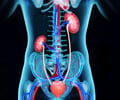A study says that major depression may increase diabetes patients' risk of developing kidney failure.

Individuals with diabetes have a high prevalence of depressive symptoms, which has previously been linked with negative health outcomes such as cardiovascular disease and premature death. Little is known about depression''s associations with long-term kidney health in diabetics, however.
To investigate, Margaret Yu, MD, MS and Bessie Young, MD, MPH (VA Puget Sound Health Care System and University of Washington) and their colleagues studied 3886 adults with diabetes who were covered by a large health maintenance organization in Washington State. A total of 448 (11.5%) of the patients had major and 327 (8.4%) had minor depressive symptoms. During a median follow-up of 8.8 years, 87 patients (2.2%) developed kidney failure.
Among the major findings:
- Patients with major depressive symptoms had an 85% higher risk of developing kidney failure, after adjusting for various factors including age, sex, race/ethnicity, marital status, education, smoking, body mass index, diabetes duration, baseline kidney function, hypertension, medication use, and adherence to diabetes self-care.
- Minor depressive symptoms were not significantly linked with the development of kidney failure.
"This is the first study to show that major depressive symptoms are associated with a higher risk of kidney failure in patients with diabetes," said Dr. Yu. "As an observational cohort study, we can only identify an association between major depressive symptoms and kidney failure; additional studies are needed to determine whether treatment of depression can reduce the risk of kidney failure."
Also, because the association was not entirely explained by differences in traditional risk factors for kidney disease or diabetes self-care characteristics, more research is needed to determine the mechanisms involved.
Advertisement
Disclosures: Dr. Katon reported board membership with Eli Lilly and Wyeth and honoraria for lectures from Eli Lilly and Wyeth, Pfizer, and Forest. No other authors reported financial disclosures.
Advertisement
The content of this article does not reflect the views or opinions of The American Society of Nephrology (ASN). Responsibility for the information and views expressed therein lies entirely with the author(s). ASN does not offer medical advice. All content in ASN publications is for informational purposes only, and is not intended to cover all possible uses, directions, precautions, drug interactions, or adverse effects. This content should not be used during a medical emergency or for the diagnosis or treatment of any medical condition. Please consult your doctor or other qualified health care provider if you have any questions about a medical condition, or before taking any drug, changing your diet or commencing or discontinuing any course of treatment. Do not ignore or delay obtaining professional medical advice because of information accessed through ASN. Call 911 or your doctor for all medical emergencies.
Founded in 1966, and with more than 14,000 members, the American Society of Nephrology (ASN) leads the fight against kidney disease by educating health professionals, sharing new knowledge, advancing research, and advocating the highest quality care for patients.
Source-Newswise














